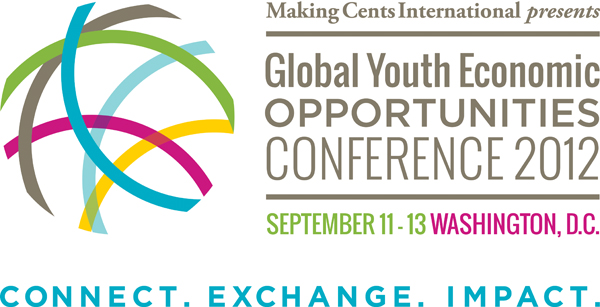Youth Economic Opportunities Conference: Identifying lessons learned and communicating impact
Insights from the 2012 Youth Economic Opportunities Conference
 September 11-13, 2012 | Washington, DC
September 11-13, 2012 | Washington, DC
This blog post, written by Heather Risley of The QED Group, LLC, recaps some key takeaways from the recent Global Youth Economic Opportunities conference, presented by Making Cents International.
My morning started off at an open session with The SEEP Network who asked the audience, “What information do you still want to know in the field of youth financial services?” and “How do you prefer to receive that information?” It was an interesting discussion to start the day, since it became clear that in fact, a lot of information and data already exists on youth financial services. The problem, many of the participants noted, was information overload with a lack of curation. If you’re a practitioner, you want to know about common obstacles on the ground and how others have surmounted them. If you’re a policymaker, you might be looking for broad recommendations. The answers may lie in existing information, but they are not packaged in a way that is useable by different stakeholders.
Making Cents International’s Youth Economic Opportunities Conference, held on September 11-13, 2012 in Washington, DC, was an important opportunity to gain greater consensus on best practices and emerging trends. Sessions were tailored to address a variety of stakeholders. Specific tracks included workforce development, financial services and capabilities, enterprise development, adolescent girls and young women, monitoring and evaluation, and impact assessment.
In a session geared toward identifying lessons learned in financing employment opportunities for young Iraqi women, Raymond Mendenilla of the USAID-Tijara project talked about some of the difficulties he originally encountered working in a Muslim context. Through rigorous tracking of outputs and a willingness to adapt their strategy, the Iraqi Youth Initiative helped approximately 400 young Iraqis, 16 percent of them women, receive $1,308,400 in microfinance loans to start a new business, which has resulted in 805 new jobs. Mendenilla outlined some keys to the program’s success:
- Before embarking on a widespread youth training program, Mendenilla’s team worked hard to ensure a sufficient number of employers were willing to provide apprenticeships to young Iraqis ready to work.
- Using local field teams to serve as recruiters allowed the program to reach more provinces and connect with youth on their level.
- Consciously publicizing the loan amounts each young Iraqi received created healthy competition among microfinance institutions, key players that provided entrepreneurs with access to finance to start their own businesses.
Although Mendenilla recognized that every project has a different context, he believed these broad themes might be applicable to other implementers doing similar work.
In the final plenary session of the day, a panel of representatives from the conference sponsors discussed their own research agendas and how organizations can partner with them. Shari Berenbach, Director of USAID’s Microenterprise and Private Enterprise Promotion Office, echoed the need for projects to be context-specific. When looking at opportunities for youth, projects need to make sure youth are trained to meet the opportunities available to them. Not everyone is cut out to be an entrepreneur, so attention also needs to be paid to labor market access. Berenbach noted that USAID is focusing on developing an Agency-wide youth policy, but even now, interventions that focus on youth are integrated into many programs across the Agency. Another important source of funding still comes from field-based missions, where a lot of activity is happening across the globe.
Deepali Khanna, Director of Youth Learning at The MasterCard Foundation and Jasmine Thomas, Program Officer at Citi Foundation, both emphasized achieving scale and rigorous measuring of impact as critical components of the projects in which they choose to invest. Khanna, in reference to MasterCard’s Foundation focus on “youth learning” in sub-Saharan Africa, specifically called out the need to improve government policies as an area where more work needs to be done. Citi Foundation is working on creating more formal standards in the area of youth entrepreneurship, which they hope will contribute to more meaningful impact over time.


